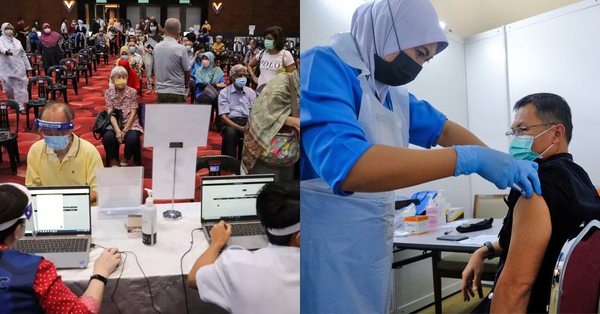Subscribe to our Telegram channel for our latest stories and breaking news.
Before getting the vaccine
1. Check with your family doctor
The Ministry of Health (MOH) has identified three groups of people that should get a pre-vaccination assessment with their regular doctor or medical specialist.
This assessment is essentially to determine whether a person is eligible for COVID-19 vaccination and to determine the most suitable type of vaccine for them.
The people who should go for a pre-vaccination assessment are:
– Individuals who are immunocompromised — history of cancer, organ transplant, on immunosuppressive drugs, or chronic HIV infection.
– Individuals with severe allergies — anaphylaxis from unknown causes, other vaccines, or drugs, or towards the first COVID-19 vaccine dose.
– Individuals with bleeding disorders — history of haemophilia, low platelet count, or on blood-thinning drugs.
Pregnant and nursing mothers are generally encouraged to get vaccinated, but it depends on gestation period and other factors; the ministry has also encouraged this group to consult their doctor prior to booking an appointment.
Image via Reuters/Malay Mail
If you have a pre-existing comorbidity that you are worried about, you are considered at higher risk for COVID-19, and thus prioritised for the vaccination, not discouraged from it.
To err on the safe side, as many elderly people have pre-existing health conditions such as high blood pressure, diabetes, or heart disease, kidney disease, liver disease, low immunity, asthma, cancer, chronic lung disease, and stroke, and may be on immunosuppressive or blood-thinning drugs, consult a medical professional if they can take the vaccine and if they should take their medications as usual on the day of vaccination.
2. Prepare the things you will need to bring
Vaccine candidates will receive their assigned vaccination distribution centre (PPV) two weeks prior to their appointment. So, review your appointment date, time, and location!
Here is a checklist of things to bring on the day of vaccination:
– A face mask (and hand sanitiser, to be cautious)
– Your IC or passport for verification
– Your mobile phone (for those who signed up with MySejahtera)
– Wear short sleeves or a shirt with loose sleeves that can be rolled up easily
– A list of the medications you are taking/illnesses you have (especially for the elderly who may forget, frontliners appreciate when family members help list or have pictures of their medication boxes!)
If you are extra hardworking, you may print the vaccination consent form and fill it up ahead of time. But don’t worry if you can’t, the healthcare workers at the PPVs are responsible for handing and explaining these forms to you anyway.
Image via Reuters/Times of India
At the vaccination distribution centre
3. Roughly know the vaccination process
Generally, here’s how the appointment will go:
– Scan your temperature and check in using MySejahtera
– Register at a registration booth using your IC
– Get briefed by a frontliner and sign a vaccination consent form — they will want to know if you have a fever, are pregnant, or have any pre-existing illness
– Receive the vaccination
– Wait in the observation area for 30 minutes to be monitored for allergic reactions
– Receive vaccination digital certificate on MySejahtera indicating you have received first dose and be given appointment date for second dose
After getting the vaccine
4. Expect mild side effects
After getting vaccinated, mild side effects are normal and expected for a few days as the vaccine builds an immune response for your protection.
Some common side effects include:
– Some pain, swelling, and redness on the arm where you got the shot
– Chills or mild fever
– Tiredness
– Headache
– Nausea
– Muscle ache
– Swollen lymph nodes
Pro tip: Arrange your vaccine appointment before a weekend, as these side effects may affect your ability to do activities for one or two days.
Image via Samsul Said/Bloomberg
5. However, know when to call a doctor for help
More serious or adverse side effects to vaccines are possible but extremely rare. Vaccines are still being continually studied to detect the occurrence of adverse reactions.
Contact your doctor or healthcare provider if you experience these symptoms:
– Redness or tenderness at the spot where you got the shot gets worse after 24 hours.
– Your side effects are getting worse or do not seem to be going away after a few days.
For AstraZeneca recipients, the MOH advises to seek medical assistance immediately if you experience the following symptoms of abnormal blood clotting within four days to four weeks:
– A severe headache that does not subside when lying down, or even after taking painkillers.
– Sudden blurred vision, difficulty speaking, weakness, or unexplained bruising or bleeding.
– Shortness of breath, chest pain, leg swelling or persistent abdominal pain.
Image via eMedicineHealth
6. Keep up preventive behaviours
It’s important that you continue to follow preventive measures even after being vaccinated. While COVID-19 vaccines have been proven effective at stopping the disease from developing, it is still unsure if vaccines can prevent the transmission of the virus to others.
Continue to protect yourself and others by:
– Washing your hands with soap and water or using hand sanitiser often
– Wearing a mask when you’re outdoors
– Keeping at least 1m distance between yourself and others
– Keeping away from crowded places
Image via Healthline


